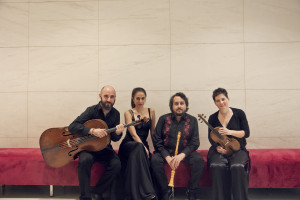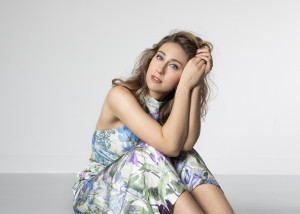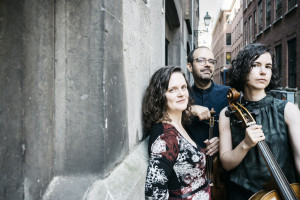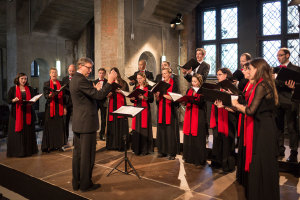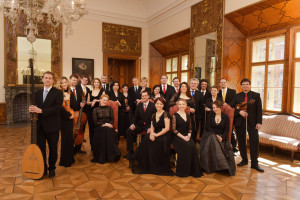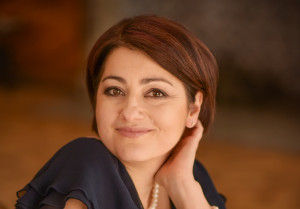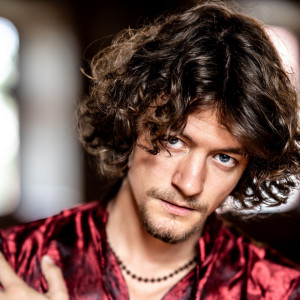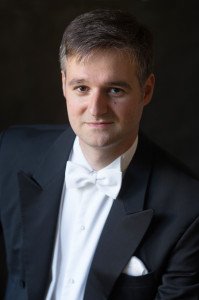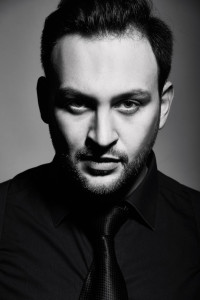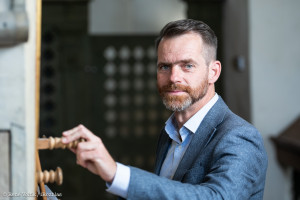Pérgamo Ensemble /ES/
Awarded in July 2019 with the Grand Prize of the Jury of the VIII Gijón Early Music Contest, Pérgamo Ensemble began to offer its first concerts in 2016. Since then they have performed concerts throughout Spain, Europe and America, highlighting the Sicut Sagittae cycle. in Naples, Noches en los jardines del Real Alcázar in Seville, the Torroella de Montgrí Festival, the Suena la Cúpula cycle at the Niemeyer Center in Avilés, the Marcos Históricos cycle at the Santander International Festival, the concert cycle at the Museo del Greco in Toledo, Lux Bella festival in Valencia, the concert season of the CaixaForum in Barcelona, the Festival Internacional de Arte Sacro de Madrid (FIAS) or the Festival Internacional de Música Sacra del Teatro Sucre de Quito, Ecuador. In February 2021, the Spanish institution Patrimonio Nacional published the documentary „Stradivarius 1700. A real dream“ about the history of the cello from the collection of the Royal Palace of Madrid, starring the Pérgamo Ensemble together with the soprano Eugenia Boix
On the other hand, its members are part of national and international groups such as The Academy of Ancient Music, L’Arpeggiata the Orquestra Barroca Catalana or Nereydas and have played regularly with soloists such as Gilles Colliard, Eugenia Boix, Christophe Coin, Elisabeth Hetherington, Manfredo Kraemer or Maria Hinojosa.
Pérgamo Ensemble is a versatile group that offers proposals ranging from purely instrumental programs to projects with national and international soloists of recognized prestige. In addition, in its interpretative catalogue we find proposals that combine the recovery of the national heritage unfairly forgotten by the passing of the centuries with some of the most successful authors of the 17th and 18th centuries.
___________
Elisabeth Hetherington /CA/
Since moving to the Netherlands, award-winning soprano Elisabeth Hetherington has quickly established herself as a stand out up-and-coming performer and interpreter of early, contemporary and modern repertoire throughout Europe. Elisabeth has been praised for her “… fearless and powerful personality, as well as her flawless technology and breathtaking presentation” (NRC, 2020) and “virtuosic grace, sophisticated dynamics and subtle colours… beautifully lyrical, somewhat fragile timbre…” (Place de l’Opera Magazine, 2020). Managing to effortlessly bridge the gap between early and contemporary music, Elisabeth has premiered and recorded numerous works throughout the Netherlands, Belgium, Norway, and Estonia.
Elisabeth is an especially passionate advocate for multidisciplinary performance. With modern dance company Leineroebana, she has developed SOLAS. Drawing on her background as a dancer, SOLAS is a fusion of music and poetry, as well as song and dance in which she demonstrates how well movement and singing live together in her (Theaterkrant, 2019). Elisabeth has created operatic roles with companies such as Holland Opera, Holland Baroque and Opera Zuid – including Senta (De Vliegende Hollander, Holland Opera 2021), The Woman (Bonsai Gardens, Opera Zuid 2020), Belina (Dido & Aeneas, Holland Baroque 2021), Susanna (Divorce of Figaro, Holland Opera 2022) and Cordelia (King Lear, Holland Opera 2019) – for which it was said “…with a silvery, pure soprano voice. She is the star of the evening and rightly receives the most applause afterwards” (Theatrekrant 2019). She founded the ensemble Duo Serenissima for whom she has had the opportunity to create programmes that have been performed in many festivals and concert series around the world. Elisabeth’s ability to programme daring and demanding recitals and concerts for world renowned ensembles and festivals has garnered her the praise of “showing how a great future in music sounds” (NRC, 2021).
In addition to her vibrant performing career, Elisabeth has received a great deal of attention for her research in the field of Original Pronunciation of Elizabethan English. She has become a sought-after clinician on the subject, giving masterclasses in conservatories around the Netherlands, as well as appearing as a lecturer in the Utrecht Festival Oude Muziek.
Elisabeth was awarded the prize of the Dutch Classical Talent Award in 2020 after taking part in the year-long competition and tour. She recorded her debut album through the Dutch Broadcasting agency Avrotros, and continues to make frequent appearances on the television and radio stations of the Netherlands.
Elisabeth completed her Undergraduate Degree in Voice Performance from the University of Toronto, Faculty of Music, and is now a cum laude graduate from the Masters of Historical Performance at the Conservatorium van Amsterdam with whom she regularly works as a guest lecturer.
___________
Scaramuccia Ensemble /ES/
Scaramuccia was founded in 2013 on the initiative of the violinist and musicologist Javier Lupiáñez with the intention of rediscovering the lesser-known baroque repertoire. Throughout their career, the ensemble has been praised by critics and audiences for the liveliness and expressiveness of their performances, their closeness to the audience and the originality of their programmes. The in-depth research work behind each programme allows Scaramuccia to often have the opportunity and the pleasure of performing unpublished and forgotten musical treasures that are hidden among the most standard baroque repertoire.
Scaramuccia has established as a unique and original project in the European Early Music scene. Their musical discourse has been praised for its sincerity combined with an intellectual approach. Among other festivals and concert halls, they have performed at Oude Muziek Festival Utrecht, Internationaal Kamermuziek Festival Utrecht – Janine Jansen and Friends, Kasteelconcerten, and Musica Antica da Camera (Netherlands), Fora do Lugar, Encontros de Música Antiga Francisco Rosado in Loulé, and Sente a História (Portugal), Festival Internacional de Arte Sacro de Madrid, Festival de Música Antigua de Xixón, Ciclo de Música Antigua de Cambados, Temporada de Música Antigua de Guadalajara, and Teatro Kursaal de Melilla (Spain), Goethe Gesellschaft Nordenham Konzerte (Germany), Museum Vleeshuis, Automne Musical de Spa, and Philarmonie de Namur (Belgium), Maldon Festival of Arts (UK), Seviqc Brezice Festival (Slovenia), Lednice|Valtice Music Festival (Czech Republic), Asolo Musica and Echi Lontani Festival (Italy), and Festival Młoda Muzyka Dawna (Poland).
In its zeal to discover new music, Scaramuccia had the privilege of being the first ensemble to have attributed the RV 820 and the RV 205/2 to Vivaldi and performing both pieces as a world première in an interview and a live concert broadcast in the programme De Musyck Kamer of the Dutch radio station Concertzender in the summer of 2014. These works, together with other lately-discovered pieces by Vivaldi for violin and basso continuo, were recorded for Ayros in 2015 as part of the ensemble’s first album.
1717. Memories of a Journey to Italy, released in 2018, is the second disc of the ensemble. It has been acclaimed by reviewers all over Europe and nominated for the 2019 ICMA Awards. Their next album, Pisendel. Neue Sonaten, was released in December 2020 and has got six nominations for the 2021 Opus Klassik awards edition and one for the 2022 ICMA Awards. In June 2023, their latest album, L’altra Venezia, was released, with world premieres by Venetian composers, among which two new sonatas by Albinoni stand out, and has also received excellent reviews and mentions, including the “Melómano de Oro”, “Disco Recomendado y Sonido Excepcional” in Ritmo magazine and “Disco Excepcional” in Scherzo magazine.
Since 2018 Scaramuccia has been producing their discography with their own label: Snakewood Editions. In 2016 Scaramuccia was unanimously chosen by the public as the best ensemble in the Göttinger Reihe Historischer Musik International Competition 2015/2016 (Germany). In 2022 their project The Cabinet II Project was finalist on the REMA European Early Music Awards in the Heritage and Repertoire category.
___________
Dresdner Kammerchor /DE/
The Dresdner Kammerchor is one of the leading choirs in Germany. Since its foundation in 1985 by Hans-Christoph Rademann, it has become firmly established on the German and European musical scenes. With initiatives such as the first complete recording of Heinrich Schütz and a continuing interest in researching and promoting the musical legacy of central Germany, the choir helps shape the cultural identity of this region, working internationally as an ambassador for Dresden and Saxony. In collaboration with the Dresdner Barockorchester and other musical partners, numerous works by Heinrich Schütz, Johann Adolf Hasse, Johann David Heinichen and Jan Dismas Zelenka have been rediscovered. The choir has been honoured with numerous prizes including the German Record Critics’ Award.
Alongside the oratories and sacred works of Baroque masters such as Bach, Telemann and Händel, the choral-symphonic repertoire of the Classical and Romantic periods from Mozart via Mendelssohn to Brahms forms another main focus of the choir’s work. The Dresdner Kammerchor is also renowned for the performance of challenging a cappella literature from the 19th and 20th centuries by composers such as Max Reger, Alfred Schnittke, Ernst Krenek, Olivier Messiaen and Herman Berlinski.
The choir specializes in modern and contemporary music. This is reflected in numerous premieres, first performances, and new works commissioned by the choir. In 2009 Hans-Christoph Rademann and the Dresdner Kammerchor initiated the Dresden Chorwerkstatt fur Neue Musik. The choir was awarded the Ernst von Siemens Music Prize for its services to contemporary music.
The Dresdner Kammerchor has received broad acclaim on its numerous concert trips in and outside Europe, i.e. USA, South Africa, India and China. The choir also receives regular invitations to international music festivals of great reputation like the Rheingau Musik Festival, Oude-Muziek-Festival Utrecht, Festivales Musicales Buenos Aires, Bachwoche Ansbach and Händelfestspiele Halle and Göttingen.
Frequent co-operations with renowned orchestras and conductors from Germany and abroad underscore the reputation of the choir. Among the most famous are the conductors René Jacobs, Sir Roger Norrington, Ádám Fischer, Riccardo Chailly, Herbert Blomstedt and the ensembles Sächsische Staatskapelle Dresden, Gewandhausorchester Leipzig, The Orchestra of the Age of Enlightenment, Concerto Köln and Akademie für Alte Musik Berlin.
___________
Ensemble Inégal /CZ/
Ensemble Inégal and its conductor Adam Viktora earned international acclaim thanks to its highly praised concerts and awarded CD-recordings, thus becoming synonymous with the rediscovery of the legacy of the ingenious Czech baroque composer Jan Dismas Zelenka.
The interpretative range of the highly versatile Ensemble Inégal spans from renaissance to contemporary music. In addition to early music, the ensemble has on its account innovatory performances and recordings of romantic (Dvořák, Rossini) and contemporary music (Britten, Pärt, Schnittke, Glass). Ensemble Inégal has performed at prestigious European festivals such as the Prague Spring Festival, Musica Antiqua Brugge, Oude Muziek Utrecht, Lufthansa Festival London, De Bijloke Gent, Stockholm Early Music Festival, Bachfest Leipzig, and many others. Ensemble Inégal has recorded 20 successful CDs earning a range of prestigious international awards (Diapason d’Or, IRR Outstanding, Goldberg 5 stars, a.o.). The ensemble is regularly featured in broadcasts of television and radio stations (BBC, EBU, Czech Television, Czech Radio, Deutschlandradio Kultur a.o.).
___________
Gabriela Eibenová /CZ/
Soprano Gabriela Eibenová is regarded as a renowned singer in the field of early music interpretation on the Czech music scene. She graduated from the Prague Conservatory, theory and performance practice of early music at Masaryk University and historical performance at JAMU. Together with organist and conductor Adam Viktora, she founded the vocal-instrumental group Ensemble Inégal, which focuses primarily on promoting the work of the Czech Baroque composer Jan Dismas Zelenka. She performs extensively with this ensemble at major international music festivals (Prague Spring, Oude Muziek Utrecht, Tage Alter Musik Regensburg, Musica Antiqua Brugge, Bach Festival Riga, International Music Festival Santander, Lufthansa Music Festival London, Stockholm Early Music Festival, and others). She has sung almost all over Europe, in Israel, Lebanon and Japan. She has recorded more than 40 CDs. She is a vocal teacher at master classes specialising in early music performance. In 2020 she established the Rosa Bohemica music festival, which uses music to enliven and resonate spaces with a strong genius loci.
___________
Jaro Kirchgessner /DE/
The countertenor Jaro Kirchgessner, born in 1997 in Neustadt an der Aisch in Middle Franconia, received his fundamental musical training with the Windsbach Boys Choir. During his time there, he performed in over 600 concerts and frequently sang as a soloist. He then spent a year at the Vocational School for Music in Dinkelsbühl under Birgit Ströbel-König. After completing his bachelor’s degree with top marks under Prof. Hartmut Zabel in Dresden, he is currently pursuing his master’s degree with Prof. Martin Wölfel at the Folkwang University of the Arts in Essen.
At a young age, he has already performed as a soloist at the Würzburger Bachtage, sung in the Kulturpalast Dresden, at the Quedlinburger Musiksommer, and recently at the Thüringer Bachwochen. Additionally, he regularly performs in Dresden, Leipzig, and Weimar.
Jaro Kirchgessner has gained operatic experience through several university projects, such as the chamber opera „Leonce and Lena“ by Kurt Schwaen, the role of Ruggiero in Handel’s „Alcina,“ as Oberon in Britten’s „A Midsummer Night’s Dream,“ and as the „Refugee“ in Dove’s „Flight.“
___________
Tobias Hunger /DE/
The tenor Tobias Hunger began his musical training with the Dresden Choir of the Holy Cross and studied with Hermann Christian Polster at the University of Music Felix Mendelssohn Bartholdy in Leipzig. As an internationally renowned concert and oratorio singer he pays special attention to the music of the 17th and 18th century. He has sung repeatedly with famous ensembles, orchestras and under conductors such as Philippe Herreweghe, Georg Christoph Biller, Václav Luks, Hans-Christoph Rademann, Ludger Rémy, Wolfgang Katschner and Ludwig Güttler. In addition to the entire vocal works of Johann Sebastian Bach his repertoire ranges from works of the Renaissance, the Baroque to Classical music and goes through to the 20s and 30s as well as the modern. So he performed successfully at the Munich Biennale in the piece L’Abcence of Sarah Nemtsov as RABBI. In the field of opera he sang further roles like PAOLINO (The secret marriage), CARAMELLO (A Night at Venice), DON OTTAVIO (Don Giovanni), FERRANDO (Così fan tutte), ACIS (Acis and Galatea) and BASILIO/DON CURZIO (Le nozze di Figaro). Tobias Hunger visited masterclasses with Peter Schreier, Scot Weir, Gerd Tuerk, Eva Randová and the King’s Singers.
___________
Jiří Miroslav Procházka /CZ/
Bass – baritone Jiří Miroslav Procházka was born in Brno in 1988. He had his first experience with singing in the children’s choir Kantiléna at the Brno Philharmonic. In 2004 he started his studies at the Brno Conservatory, where he studied with Mgr. Petr Julíček, then classical singing at the Bratislava Academy of Performing Arts under the pedagogical guidance of Prof. Hana Bandová-Štolfová, ArtD. In 2013 he finished his studies at the Prague Academy of Performing Arts under MgA. Martin Bárta. Since 2013 he has been a guest of the Janáček Opera Brno, he also collaborates with the National Theatre in Prague and the National Theatre of Antonín Dvořák in Ostrava. He regularly collaborates as a guest with the JAMU Chamber Opera.
In 2011 he won 2nd prize in the Summer School of Baroque Music competition, where he also participated in baroque performance courses with Polish countertenor Jakub Burzynski and in 2013, also with Adam Plachetka.
He has also performed at music festivals such as Music Festival Znojmo (CZ), Smetanova Litomyšl (CZ), Janáček May (CZ), Janáček Brno (CZ), 9. (CZ), Olomouc Baroque Festival (CZ), Soozvuk Bratislava (SVK), Mikolow Music Days (POL), Zadar Music Evenings (HR), International Music Festival Weingarten (DE) and others.
He has collaborated with many important music and theatre ensembles such as: Brno Philharmonic Orchestra, Prague Philharmonic Orchestra, South Bohemian Philharmonic Orchestra, Czech Ensemble Baroque, Collegium 1704, Ensemble Inégal, Musica Aeterna-Bratislava, Musica Florea, Ensemble Damian, Musica figuralis, Musica da camera Brno, Czech virtusi, Opera diversa, Moravian Piano Trio, Trio Milonguero Peter Zamečník, Q-vox, Children’s Choir Kantiléna, Divadlo Feste and many others.
___________
Adam Viktora /CZ/
Organist and conductor Adam Viktora performs at music festivals throughout Europe, lectures and performs at international organ congresses, serves as an advisor on expert committees for the restoration of important historic organs, and records for European radio and television stations. He takes a great interest in historic organs and in activities aimed at their preservation and promotion. He is the founder and artistic director of the Czech Organ Festival. He teaches organ at the Conservatory in Pilsen and historically informed performance at the Academy of Performing Arts in Prague. He is the artistic director of the Ensemble Inégal and the Prague Baroque Soloists, with whom he has recorded over 20 award-winning CDs and given countless concerts at major European festivals such as Prague Spring, Oude Muziek Utrecht, Musica Antiqua Brugge, Lufthansa Festival London, Bachtage Leipzig, Tage alter Musik Regensburg, Stockholm Early Music Festival and others. Adam Viktora has also become a prominent figure in the process of rediscovering the work of the Czech Baroque genius, Jan Dismas Zelenka. He founded and organizes the Zelenka Festival Prague – Dresden and hosts the annual musicological colloquium Zelenka Conference Prague. Together with Ensemble Inégal he has won the prestigious French Diapason d’Or award four times
